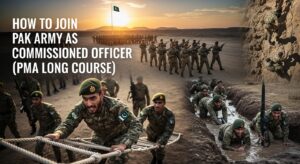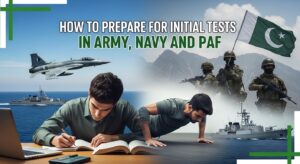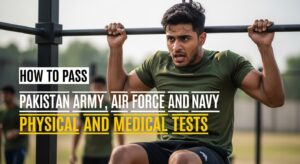It’s fantastic that you’re considering joining the Pakistan Army through the Lady Cadet Course (LCC)!
It’s a highly respected and rewarding path for women who wish to serve their nation.
This guide is designed to walk you through every single step of the application process, from understanding the eligibility criteria to the final selection.
The LCC offers a direct commission as a Captain in various specialized corps of the Pakistan Army, opening doors to a challenging and fulfilling career. It’s a rigorous process, but with dedication and proper preparation, it’s absolutely achievable. Let’s dive in!
Step 1: Understanding the Lady Cadet Course (LCC) and Its Requirements
Before you even think about filling out a form, you need to have a crystal-clear understanding of what the LCC entails and whether you meet the fundamental requirements. This isn’t just about ticking boxes; it’s about knowing if this path truly aligns with your aspirations and capabilities.
What is the Lady Cadet Course (LCC)?
The Lady Cadet Course (LCC) is a specialized training program for female graduates who wish to join the Pakistan Army as commissioned officers. Upon successful completion of the course at the Pakistan Military Academy (PMA), Kakul, you are commissioned as a Captain in a specific corps, such as Engineers, Signals, Army Education Corps, Ordnance, Electrical & Mechanical Engineering (EME), or Remount Veterinary and Farms Corps (RV&FC). The duration of the training is typically around 6 months.
Key Eligibility Criteria:
The eligibility criteria are strict and non-negotiable. Make sure you meet every single one of them. These can vary slightly with each advertisement, so always refer to the latest official advertisement released by the Pakistan Army. However, generally, here’s what to expect:
| Category | Details |
|---|---|
| Gender | Female (Course exclusively for women) |
| Nationality | Citizens of Pakistan and domicile holders of Azad Jammu & Kashmir / Gilgit-Baltistan. Dual nationals must surrender other nationality upon final selection. |
| Marital Status | Unmarried (common requirement for initial entry) |
| Age Limit | Up to 28 years on the cutoff date specified in the advertisement (e.g., Nov 1 of the application year) |
| Educational Qualification | 16 years of education (Bachelor’s or Master’s degree) in discipline specified for the corps. |
| Common Corps & Disciplines | Corps of Engineers: BS in Architecture, Civil Engineering Corps of Signals: Computer Science, Software Engineering, IT Security, Telecom Engineering EME: Mechatronic, Bio-Medical, Electrical, Mechanical Engineering Army Education Corps (AEC): Master’s in English, Mathematics, Physics, Chemistry, Geography, Islamic Studies, Pakistan Studies, Psychology Corps of Ordnance: Textile Engineering RV&FC: Doctor of Veterinary Medicine (DVM) Army Medical Corps (AMC): MBBS/BDS (may vary depending on advertisement) |
| Academic Performance | Minimum CGPA 2.5/4 or 60% marks M.Phil/MS degrees may be preferred No 3rd Division/Grade D; usually only one 2nd Division/Grade C allowed Degree must be from HEC/PEC recognized university (foreign degrees must be recognized by HEC) Private candidates typically not eligible |
| Physical Standards | Height: Minimum 5 feet (152.4 cm) Weight: Proportionate to height (BMI standard) Vision: Must meet military standards (PAO 11/82); detailed eye exam during medical tests |
| Preparation Tips | Check Latest Advertisement: Refer to official sources (www.joinpakarmy.gov.pk) for accurate dates and requirements Self-Assess Honestly: Ensure you meet academic and physical standards before applying Identify Your Corps: Choose corps based on educational background to streamline application process |
Step 2: Online Registration
Once you’re confident you meet the eligibility criteria, the next step is the online registration. This is the most convenient way to apply.
| Step | Details / Instructions |
|---|---|
| Visit the Official Website | Go to the official Pakistan Army website: www.joinpakarmy.gov.pk |
| Locate the LCC Section | On the homepage, look for the “Lady Cadet Course (LCC)” section. Usually a clear link or advertisement will be available. |
| Read Instructions Carefully | Review all instructions, guidelines, and FAQs on the registration portal before filling the form to avoid common mistakes. |
| Create an Account (if required) | Some portals may require a username and password. Remember your login details. |
| Fill the Online Application Form | Personal Information: Name, father’s name, date of birth, CNIC, domicile, address, contact number, email. Double-check accuracy. Educational Details: Enter all academic qualifications, universities, passing years, marks/CGPA. Keep original documents handy. Physical Details: Provide height and weight accurately. Corps Preference: Select corps based on educational background. |
| Upload Required Documents | Some systems may require scanned copies of CNIC, academic documents, or photograph. Ensure correct format and size. |
| Choose Your AS&RC | Select a convenient Army Selection and Recruitment Centre for preliminary tests. Choose the nearest to your residence. |
| Submit the Application | Review all information carefully before submission. |
| Print Roll Number Slip | After submission, a roll number slip will be generated with test date, time, and venue. Print multiple copies. |
| Note Test Date and Time | Record the exact date and time for your preliminary test. Once assigned, it is generally not changeable. |
| Tips for Online Registration | Ensure stable internet connection. Provide truthful and precise information. Maintain a functional email account for updates. Save a screenshot or PDF copy of the application. Apply well before the deadline to avoid technical issues. |
Step 3: Preliminary Tests at Army Selection and Recruitment Centre (AS&RC)
This is where the real journey begins. After successful online registration, you’ll be called for preliminary tests at your chosen AS&RC. This phase includes intelligence tests, academic tests, physical tests, and an initial medical examination.
What to Bring to the AS&RC:
This is extremely important. Without the correct documents, you won’t be allowed to proceed.
| Document / Item | Details / Instructions |
|---|---|
| Printed Roll Number Slip | Generated after online registration. Bring the original printout. |
| Original Educational Certificates/Degrees/Detailed Mark Sheets | Bring all original academic documents from Matric up to the highest qualification. |
| Two Attested Photocopies of Each Educational Certificate/Degree | Attested by a Class 1 Gazetted Officer or Principal. |
| Original CNIC (Computerized National Identity Card) | Required for candidates 18 years and above. |
| Original Form B + Guardian’s CNIC | For candidates under 18 years of age. |
| Photocopies of CNIC | Two attested photocopies. |
| 6 x Colored Photographs | Duly attested (front and back) by a Class 1 Gazetted Officer or Principal. |
| Original Domicile Certificate | Also bring an attested photocopy. |
| No Objection Certificate (NOC) | Required if currently serving in any government institution or department. |
| Crossed Postal Order of Rs. 100/- | In favor of Director General Personnel Administration (DGPA), GHQ Rawalpindi. Usually for the prospectus fee. |
| HEC/PEC Verified Degrees | Ensure your degrees are verified by HEC/PEC, especially for degrees requiring official verification. |
The Preliminary Test Stages:
| Test & Details |
|---|
| Written / Intelligence Tests: Conducted on computers; mostly MCQs. |
| Verbal Intelligence: Logical reasoning, analytical skills, word/concept relationships, series completion, coding/decoding, blood relations, analogies, common sense. |
| Non-Verbal Intelligence: Visual information, patterns, shapes, spatial reasoning, image series, odd one out, geometric patterns. |
| Academic Test (Professional Written Test): Tests knowledge in your chosen corps/field (e.g., Computer Science for Signals, Engineering for Engineers, General Knowledge/English for AEC), plus Pakistan Affairs and current affairs. |
| Preliminary Medical Tests: Conducted at AS&RC after passing written test. Includes height/weight check, vision test, hearing test, and basic physical examination (e.g., knock-knees, flat feet). |
| Physical Test (Female Candidates): 1.6 KM (1 mile) run in 14 minutes. |
Step 4: Inter Services Selection Board (ISSB) Tests
Candidates who successfully clear the preliminary tests at the AS&RC will be shortlisted for the ISSB. This is arguably the most crucial and comprehensive stage of the selection process. You will receive an intimation for the ISSB tests through the website and a call-up letter. The ISSB is designed to assess your leadership potential, psychological makeup, and overall suitability for a career as an officer.
What to Expect at ISSB:
The ISSB is a 4-day process held at one of the ISSB centers (Kohat, Gujranwala, Malir, or Quetta). You will stay at the center during this period.
| Day & Activity | Details |
|---|---|
| Day 1: Arrival & Initial Tests – Reporting | Candidates report to the ISSB center. |
| Day 1: Arrival & Initial Tests – Briefing | Briefing about the schedule and procedures. |
| Day 1: Arrival & Initial Tests – Psychological Tests | Major component of Day 1; assess personality and thought processes. |
| Day 1: Arrival & Initial Tests – Intelligence Tests (Verbal & Non-Verbal) | Similar to preliminary tests but more challenging. |
| Day 1: Arrival & Initial Tests – Picture Story Writing (TAT – Thematic Apperception Test) | Shown a picture and asked to write a story about it: what led to the scene, what’s happening, and the outcome. Reveals personality, thought patterns, and approach to situations. |
| Day 1: Arrival & Initial Tests – Word Association Test (WAT) | Shown words and must write the first thought that comes to mind. Assesses subconscious thoughts and reactions. |
| Day 1: Arrival & Initial Tests – Sentence Completion Test (SCT) | Complete given sentences, revealing personality and attitudes. |
| Day 1: Arrival & Initial Tests – Situation Reaction Test (SRT) | Presented with challenging situations and asked how you would react. Assesses problem-solving skills, decision-making, and emotional intelligence. |
| Day 1: Arrival & Initial Tests – Self-Description (SD) Test | Write about your qualities as perceived by yourself, parents, friends, teachers, and qualities you want to develop. |
| Day 2: Group Tests & Interview – Group Discussion (GD) | Discuss a topic with a group of candidates. Observes participation, logical arguments, leadership, and teamwork. |
| Day 2: Group Tests & Interview – Individual Obstacles | Complete a set of physical obstacles individually. Tests agility, courage, and determination. Examples: monkey bridge, wall climbing, simple jumps. |
| Day 2: Group Tests & Interview – Group Planning (GP) | Solve a hypothetical problem collectively. Tests teamwork, planning skills, and contribution to group effort. |
| Day 2: Group Tests & Interview – Command Task (CT) | Lead a small group to accomplish a task. Assesses leadership under pressure. |
| Day 2: Group Tests & Interview – Interview with Psychologist/President of the Board | Comprehensive interview covering personal background, educational history, hobbies, interests, general knowledge, motivation, strengths, and weaknesses. May include direct and challenging questions. |
| Day 3: Remaining Group Tests & Interview – Continuation of Group Tests / Interviews | Remaining group tasks or interviews might take place. May include a second interview with the Deputy President or another panel member. |
| Day 4: Conference & Departure – Conference | All candidates attend a conference where performance is reviewed by board members. Candidates are informed if they are recommended or not recommended. |
Tips for ISSB:
- Be Yourself: The ISSB aims to see your natural personality and leadership traits. Don’t try to fake it, as psychologists are trained to spot inconsistencies.
- Confidence, Not Arrogance: Be confident in your abilities and opinions, but also open to others’ perspectives.
- Positive Attitude: Maintain a positive and enthusiastic approach throughout the tests, even if you feel tired or challenged.
- Team Player: Show that you can work effectively in a team, respecting others’ opinions and contributing constructively.
- Physical Fitness: Continue your physical training to easily clear the obstacles and physical tests.
- General Knowledge & Current Affairs: Be well-versed in national and international current affairs. Read a good newspaper regularly.
- Self-Awareness: Understand your strengths and weaknesses, and be able to articulate them maturely.
- Time Management: Practice completing tasks within given time limits, especially for written psychological tests.
- Dress Code: Follow the dress code instructions provided in your call-up letter. Generally, neat and modest attire is expected.
Step 5: Final Medical Examination (CMH)
If you are recommended by the ISSB, you will undergo a detailed and thorough medical examination at a Combined Military Hospital (CMH). This is more comprehensive than the preliminary medical check-up.
What the CMH Examination Includes:
- Detailed Physical Examination: Full body check for any anomalies, deformities, or chronic conditions.
- Blood Tests: For various parameters, including blood count, sugar levels, and screening for diseases like Hepatitis B & C.
- Urine Tests: To check for kidney function and other issues.
- X-rays: Chest X-ray is common.
- ECG: Electrocardiogram to check heart function.
- Eyesight & Dental Check: Thorough examination by specialists.
- ENT Examination: Ears, Nose, and Throat.
- Specialist Consultations: If any issue is suspected, you might be referred to specialists (e.g., orthopedics, ophthalmology).
Tips for CMH Medical:
- Be Honest: Disclose any pre-existing medical conditions. Hiding them can lead to serious issues later.
- Follow Instructions: Adhere to all instructions given by the medical staff (e.g., fasting before certain tests).
- Maintain Health: Lead a healthy lifestyle, avoid unhealthy eating habits, and ensure you are in the best possible physical condition.
- Clearance: If you are declared medically unfit, you might have the option to appeal the decision through an Appeal Medical Board (AMB), but this is only for specific conditions and not always guaranteed.
Step 6: Interview by General Headquarters (GHQ) Selection Board
Candidates who are recommended by ISSB and declared medically fit by CMH will be called for a final interview by the GHQ Selection Board at Rawalpindi. This is the ultimate stage of the selection process.
What to Expect at the GHQ Interview:
- Panel Interview: You will be interviewed by a high-ranking panel of officers, usually including senior military personnel and specialists.
- Scope: The interview will be broad, covering:
- Your Personality: Why you want to join the Army, your motivations, strengths, weaknesses, hobbies, family background.
- General Knowledge & Current Affairs: In-depth questions on national and international issues, defense matters, and the structure of the Pakistan Army.
- Academic & Professional Knowledge: Questions related to your field of study and how you envision contributing to the Army through your expertise.
- Leadership & Aptitude: Situational questions to assess your decision-making, crisis management, and leadership potential.
- Confidence & Communication: Your ability to articulate your thoughts clearly, confidently, and concisely.
Tips for GHQ Interview:
- Research Thoroughly: Understand the Pakistan Army’s structure, its corps, recent operations, and national defense policies.
- Stay Updated: Be exceptionally well-informed about current affairs, especially those related to Pakistan.
- Practice Mock Interviews: If possible, do mock interviews with someone experienced in such selections.
- Confidence is Key: Present yourself with confidence, maintain eye contact, and speak clearly.
- Be Genuine: Your passion for serving the nation should come across authentically.
- Dress Formally: Wear clean, formal, and appropriate attire.
- Prepare Your “Why”: Be ready to explain convincingly why you want to join the Pakistan Army and what unique qualities you bring.
Step 7: Final Selection and Merit List
The final selection is made by General Headquarters (GHQ) based on your overall performance throughout the entire process: initial tests, ISSB recommendations, medical fitness, and the GHQ interview.
- Merit-Based Selection: Selection is purely based on merit. Only the top candidates who excel in all stages are finally selected.
- Notification: Selected candidates will be notified.
Step 8: Training at Pakistan Military Academy (PMA), Kakul
Congratulations if you’ve made it this far! This is where you begin your transformation into a commissioned officer.
- Training Duration: The LCC training at PMA, Kakul, typically lasts for 6 months.
- Curriculum: The training is rigorous and comprehensive, designed to instill military discipline, leadership skills, physical fitness, and professional knowledge. It includes:
- Physical Training: Intensive physical exercises, drills, and obstacle courses.
- Military Academics: Study of military history, strategy, tactics, and ethics.
- Leadership & Character Building: Development of leadership qualities, teamwork, and strong moral character.
- Weapons Training: Handling and firing various weapons.
- Field Training: Exercises in tactical environments.
- Commissioning: Upon successful completion of the training, you will be commissioned as a Captain in your respective corps.
Step 9: Career Prospects and Bond
Once commissioned, you begin your career as a Captain in the Pakistan Army.
- Career Progression: You will have opportunities for professional growth, promotions to higher ranks (Major, Lieutenant Colonel, etc.), specialized courses, and diverse postings within Pakistan and abroad.
- Service Bond: Finally selected candidates are usually required to sign a bond to serve the Army for a minimum period (e.g., 7 years). This ensures the Army recoups its investment in your training.
General Tips and Considerations Throughout the Process:
- Stay Informed: Regularly check the official Pakistan Army website (www.joinpakarmy.gov.pk) and reputable news sources for updates and announcements regarding the LCC.
- Maintain Discipline: The Army values discipline above all else. Start incorporating discipline into your daily routine now.
- Mental Toughness: The entire process, especially ISSB and training, will test your mental resilience. Develop a positive mindset and learn to cope with pressure.
- Physical Fitness: This cannot be stressed enough. Consistent physical activity is essential.
- Ethical Conduct: Uphold high ethical standards at all times. The Army places immense importance on character and integrity.
- Networking (Sensibly): Join online forums or groups where LCC aspirants share experiences and tips. However, be wary of misinformation and always cross-verify with official sources. Avoid sharing personal sensitive information publicly.
- Family Support: Discuss your aspirations with your family. Their support will be invaluable during this challenging journey.
- Patience: The selection process can be lengthy. Be patient and persistent.
Applying for the Lady Cadet Course is a profound decision that requires immense dedication, hard work, and a strong desire to serve the nation. While the journey is challenging, the reward of wearing the uniform and contributing to the defense of Pakistan is immeasurable. Good luck!











